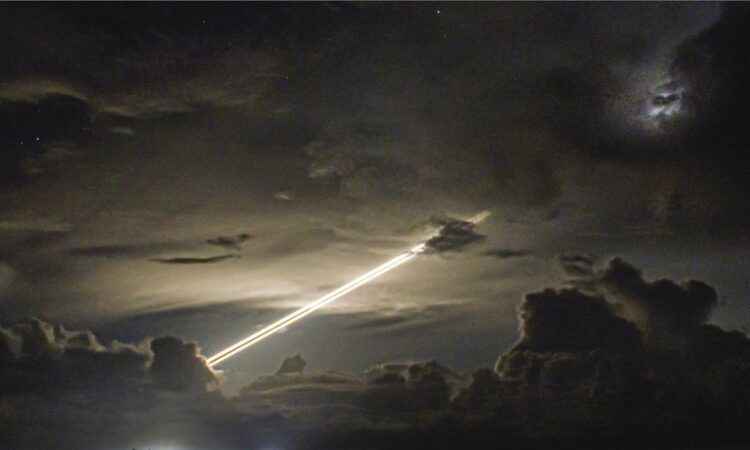
U.S. defense officials are concerned the military may lose access to crucial staging ground in the Pacific region — and potentially cede it to China — because of a lapse in funding held up in Congress.
At risk are a set of agreements dubbed Compacts of Free Association, or COFA, under which the U.S. provides aid and other services to three island states: Palau, Micronesia and the Marshall Islands. In return, those countries allow America exclusive military access to their territory, which in total is larger than the continental United States when including their surrounding waters.
Last year, after months of negotiation, the three states signed an updated agreement for $7 billion in U.S. support over 20 years. But that funding has not yet passed in Congress. In the meantime two of the three islands’ current pacts have expired and are now tied to the temporary spending bills that have kept the U.S. government open since late last year.
Palau’s agreement lapses at the end of this fiscal year, but the government there is facing budget shortfalls.
“We’re already late in getting this done,” Jedidiah Royal, the Pentagon’s deputy for Indo-Pacific policy, said in an interview with Defense News.
At stake for the Pentagon are three core security concerns.
The first is competition with China. The islands — collectively referred to as the Freely Associated States — sit near the U.S. territories of Guam and the Northern Mariana Islands and American partners such as Papau New Guinea and Australia. Defense officials consider it indispensable territory.
“They’ve been able to rely on that assumption of presence and access for all of their planning,” said Kathryn Paik, who until last year led the National Security Council’s portfolio for the region. “Every contingency you can imagine in the Pacific — Korea, Taiwan — everything depends on [those] assumptions of defense access.”
Right now, the U.S. has exclusive access to the three islands’ territory, meaning American ships can enter their waters and American planes can fly through their airspace. At the same time, America can also deny the same access to U.S. adversaries, in particular China.
That is crucial to maintaining deterrence in an increasingly competitive region, Siddharth Mohandas, then-deputy assistant secretary of defense for East Asia, said in testimony before Congress last year.
Another security concern involves the United States’ existing defense sites on the islands. The Marshall Islands are home to the Ronald Reagan Ballistic Missile Defense Test Site, and the U.S. is building a radar installation on Palau.
Royal said his office hasn’t studied how much it would cost to relocate these assets and therefore decline to attach a dollar figure to it. But he said that endeavor wouldn’t be cheap, and outside experts have estimated it could cost hundreds of billions of dollars.
Lastly, officials across the government are concerned about credibility. The hallmark of the Biden administration’s approach to the Indo-Pacific has been its work with allies and partners. In the last few years, the government has helped widen and deepen security ties with countries across the region, including the neighborhood affected by COFA.
In recent years, China has bolstered its influence with nearby island nations. The Solomon Islands flipped its diplomatic recognition from Taiwan to China in 2019, a win for Beijing, which considers Taiwan a renegade province and has threatened to take it back by force. Days after Taiwan’s presidential elections this year, in which a pro-independence candidate won, the island nation of Nauru also restored diplomatic relations with Beijing over Taipei.
The Freely Associated States have reminded the U.S. of their value, Royal said, but “they’re also telling us that we’re not the only game in town.”
Paik also emphasized concerns from the regional partners.
“We have been fighting against this skepticism that we’re hearing from leaders across the region: ‘Are you really here to stay this time?’” she said.
‘Working around the clock’
A bipartisan group of almost 50 House members this week wrote to the chamber’s speaker urging him to pass the agreements. And Royal’s office has increased its tempo of briefings before Congress on the issue in the last two months. He said his team hasn’t received pushback.
But the hitch involves funding trade-offs. House leadership has demanded $2.3 billion of the agreements be met with other spending cuts — against the administration’s position that the pacts shouldn’t require offsets.
COFA funding was included in the first draft of the fiscal 2024 National Defense Authorization Act, but didn’t make the final text when negotiators couldn’t agree to offsets in time. Neither did it make the most recent text of the $95 billion security supplemental that passed the Senate in February.
A congressional aide familiar with the discussions said the issue has the attention of leadership, and that representatives are asking to attach funding to the supplemental. But that bill itself has stalled.
“We’re just working around the clock to find the offset and then put it in the legislative vehicle that’s readily available,” the aide said.
In the meantime, U.S. access to the territories is up to the discretion of the countries party to COFA. Those nations can revoke that access at their discretion, and the longer it takes to fund the pacts in Congress, the more pressure their leaders will face to hedge against American dysfunction, said Arnold Palacios, governor of the Northern Mariana Islands.
“Patience is a virtue, but it also has its limits,” he told Defense News.
Noah Robertson is the Pentagon reporter at Defense News. He previously covered national security for the Christian Science Monitor. He holds a bachelor’s degree in English and government from the College of William & Mary in his hometown of Williamsburg, Virginia.






